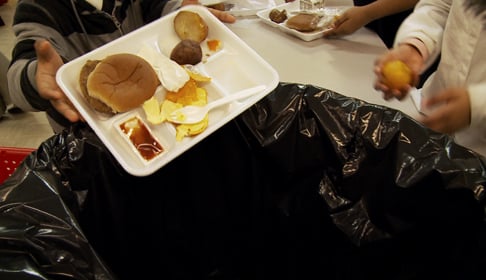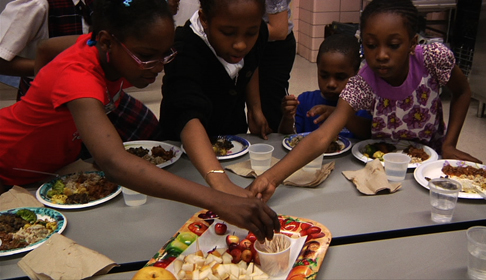By Gene Baur, president and co-founder
This year, filmmaker James Costa and Birdstreet Productions released “Lunch Hour.” Celebrated by Forbes magazine and Mother Jones as a powerful new documentary about our food system, the film examines the National School Lunch Program, childhood obesity, and our country’s addiction to unhealthy foods.
Watch the film. Host a screening. Make a change. Find out more about what you can do at the film’s website.
James Costa is a board member of the International Documentary Association, a member of the British Academy of Film and Television (BAFTA), and recently joined the Farm Sanctuary Board of Directors. James answered a few questions for us about his film.
Interview with James Costa
Farm Sanctuary: What inspired you to make Lunch Hour? Do you think the timing is significant?
James Costa: I was visiting a school and saw what they were having for lunch. It was not something I’d give to my worst enemy. The timing is great, because right now everyone is concerned with what our unhealthy American diet is doing to our kids.
FS: You’ve made the film readily available to viewers through Amazon and iTunes. Tell us a little more about this grassroots approach to releasing Lunch Hour.
JC: A film on school lunch is not going to go head-to-head with a blockbuster at the cineplex. Releasing it through iTunes and other digital platforms was the best idea, since everybody got to view it on the same day. It wasn’t like you had to live in NYC or LA to see it. A person living in the smallest town in America could see it as long as they had the Internet.
FS: What was the most surprising thing you learned during the making of the film?
JC: How certain groups were so suspicious of the film before they even saw it. They thought it was a film that was going to attack the food service workers and blame everything on them. It just shows you how attacked they must feel. Once they watched the film, they realized I was praising them.
FS: What sort of response has the film received thus far?
JC: The people who have seen it have really connected to it. When I am lucky enough to attend a screening, the discussion is lively, and you can see and hear all the wheels turning to get this issue to a result where kids get healthy meals.
FS: You’ve been a longtime supporter of Farm Sanctuary and are deeply involved with other animal advocacy efforts. What are some of the connections between factory farming and the issues surrounding America’s national school lunch program?
JC: A lot of the meat that is in the school lunch program comes from factory farms. We have to understand that the ill effects of factory farming are going to be consumed by the children of America. It’s pretty frightening. I’m surprised parents aren’t going to the schools with torches and pitchforks asking for this disgraceful practice to end.
FS: Considering the reliance on factory-farmed meat in America’s schools, what kind of impact do you think a shift to healthier lunches for children will have on the industrial food system and farm animals?
JC: There will be less demand for the products of factory farms and more demand for healthier, plant-based foods. I don’t mean to get preachy here, but if something is not good for you, you can’t wish it to suddenly be good for you or keep eating it and expect different results. Kids need healthy foods to remain focused in school and be the best students they can be. Giving them junk food because they are used to it is not a solution. It’s a sellout that only hurts kids in the long run. Sorry, but I never want to defend that side of the argument that defends the status quo. It’s not a good side to be on.
FS: The film points out that we are at times too embarrassed to look at our own complicity in how our children are treated, and it prompts us to act on their behalf as their voice for change. What if any connections do you draw between this important work for children and your animal advocacy work?
JC: We in the animal rights movement need to get kids to start eating healthy now, so when they become adults, they won’t feel like they’ve been deprived of anything. Kids are smart and love animals and don’t want to see them hurt. Parents don’t want to see their kids being sick and unhealthy. Getting the word out to parents about what goes in their kids’ school lunches is a start. It’s why I made Lunch Hour. Getting involved in this issue is good for the kids, animals, and the environment. It’s a win-win-win!


